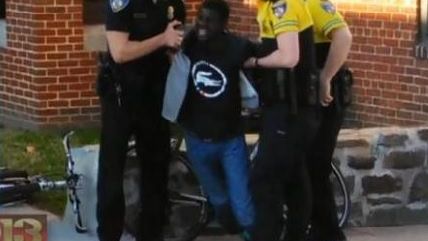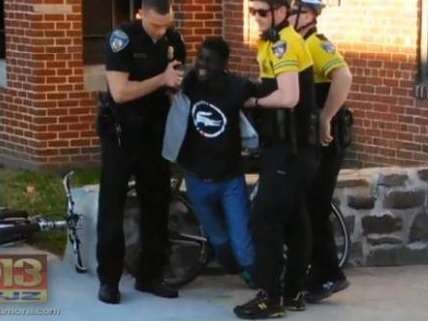Freddie Gray's Arrest Record Explains Why He Ran, Not Why He's Dead
Cops still haven't explained how he died in their custody, but insist they did nothing criminal.


Freddie Gray's lengthy arrest record is making the rounds on social media as certain people look for any reason to dismiss the grievances over police violence residents of Baltimore have expressed. Most of the charges on the record are drug-related, and most did not end in a conviction. But Freddie Gray's record, no matter what's on it, doesn't explain why he died. Gray died from a fatal spine injury days after being arrested for alleged possession of a knife. Police say they ran after Gray because he ran when they made eye contact with him. His arrest record may explain why he ran. He's known to police—and cops tend to come back to the people they know. Since he's got significantly more arrests than convictions, perhaps that day he had less patience than usual at playing the role of job justification for a bunch of bored Baltimore cops. So he ran because he valued his freedom.
Gray wasn't shot by cops. He suffered a fatal spine injury. Six officers were suspended with pay over the incident and at least one refuses to talk. Gray's family says cops did not get him medical help in a timely fashion. The police won't say what any of the cops involved in Gray's fatal arrest have said, and have as of yet not offered any explanation publicly as to why Gray died. When the same cops make an arrest in Baltimore, even if it was a mistaken or wrongful one, the suspect, or victim, often loses his job. There's little leeway shown by police toward the people they arrest, whom they often treat as if they were already guilty. The disparity between the way cops treat us and the way they treat each other is one contributing factor to the tensions over police abuse. The police union called protesters a "lynch mob" when it was peacefully demanding justice (cops claim some protesters wanted to see the police "imprisoned immediately"—I never saw such a sign, but considering if I were found next to a cop who had suffered a fatal spine injury I would be arrested it's kind of ridiculous for cops to insist no arrest in their case is normal). Now they have a riot.
The media, in the meantime, paid little attention to the protests in Baltimore when they were peaceful. Even when they started getting violent, CNN wouldn't cut away from the White House Correspondents' Dinner. Yesterday afternoon non-stop coverage started, focused on just the rioting, of course. When riots erupted after the San Francisco Giants won the World Series last year, it didn't stop anyone on ESPN from focusing on the merits, or faults, of the championship-winning Giants team. Perhaps CNN's reporters, many of whom acted as if the riots were happening without any context, can take some notes from ESPN.


Show Comments (137)